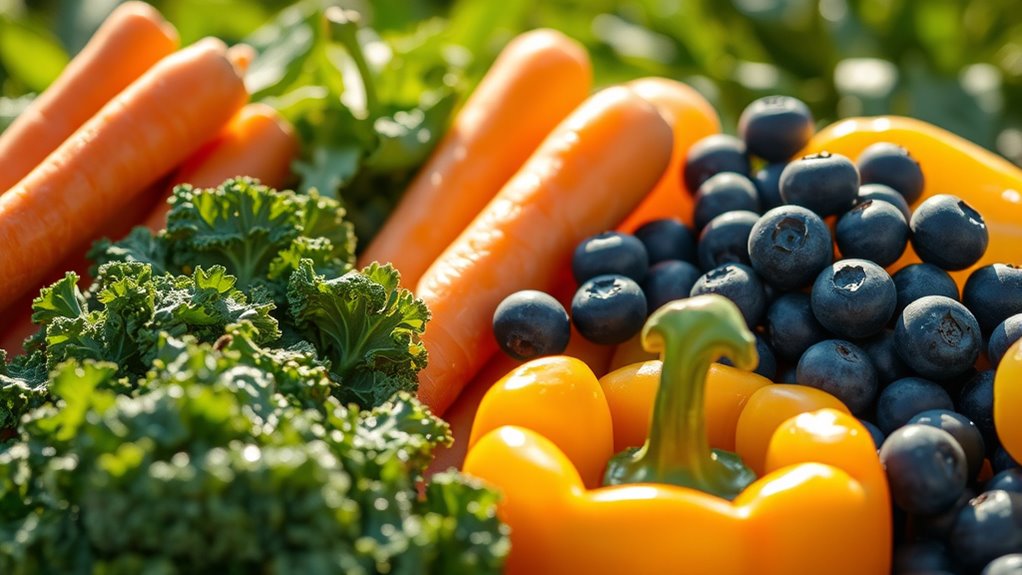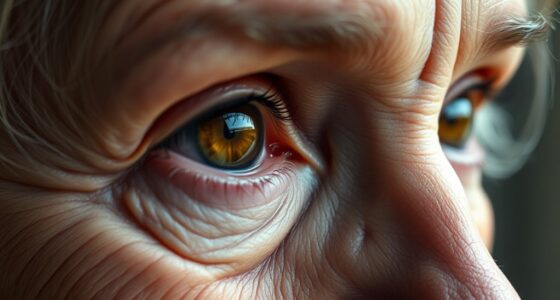To keep your eyes healthy, you need essential nutrients like Vitamins A, C, and E, along with omega-3 fatty acids. Vitamin A helps with night vision, while Vitamin C protects against cataracts. Vitamin E reduces oxidative stress, and omega-3s support retinal health. Zinc plays a crucial role in transporting Vitamin A, and carotenoids like lutein and zeaxanthin protect your eyes from harmful light. There’s more to discover about ensuring ideal eye health and nutrition.
Key Takeaways
- A balanced diet rich in Vitamin A, C, E, and omega-3 fatty acids is vital for maintaining good vision and eye health.
- Lutein and zeaxanthin, found in leafy greens, protect the retina and can significantly reduce the risk of age-related macular degeneration.
- Zinc is essential for transporting Vitamin A to the retina and preventing night blindness, with recommended daily intakes of 11 mg for men and 8 mg for women.
- Antioxidants like Vitamins C and E combat oxidative stress, lowering the risk of cataracts and supporting overall retinal health.
- Staying hydrated and maintaining a healthy lifestyle enhance nutrient circulation, which is crucial for optimal eye function and reducing strain.
The Role of Nutrition in Eye Health
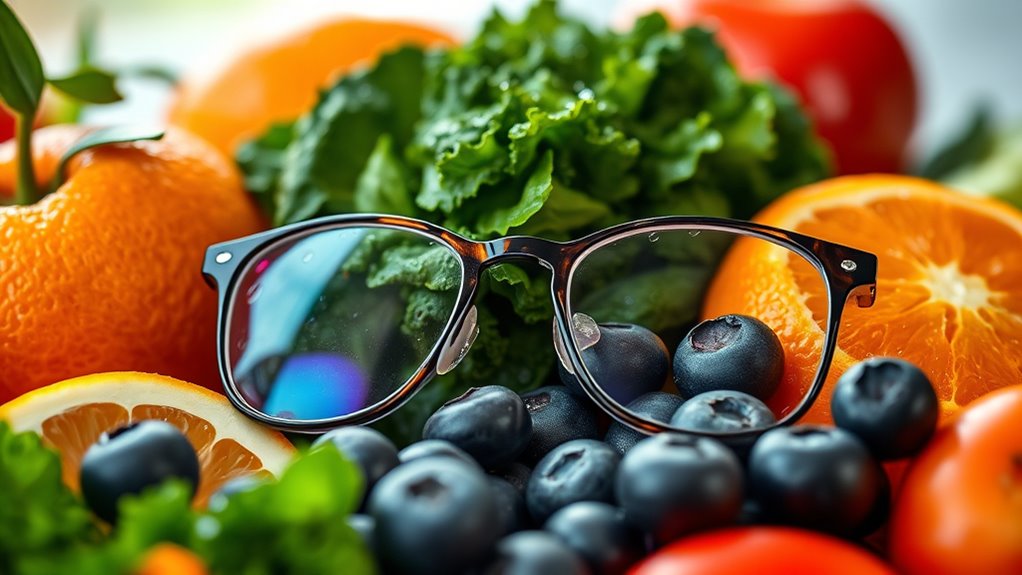
When it comes to maintaining good vision, nutrition plays an essential role that you can’t afford to overlook. A balanced diet rich in Vitamin A, Omega-3 fatty acids, and antioxidants like lutein and zeaxanthin is necessary for eye health.
These nutrients help combat age-related macular degeneration (AMD) and cataracts. Lutein and zeaxanthin, found in leafy greens, can reduce AMD risk by up to 57%.
Vitamin C acts as a powerful antioxidant in the eye, protecting against oxidative damage. Zinc is crucial for transporting Vitamin A to the retina, preventing night blindness, and it’s abundant in foods like oysters and pumpkin seeds.
Prioritizing these nutrients can greatly enhance your eye health and overall vision.
Essential Nutrients for Vision
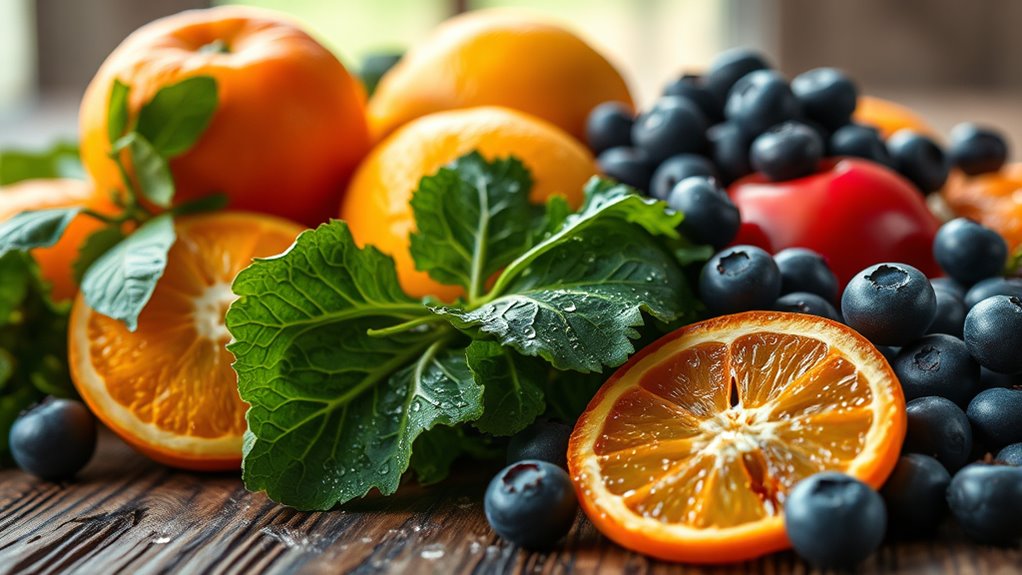
Maintaining eye health means understanding the specific nutrients that support vision. Here’s what your eyes crave:
- Lutein and Zeaxanthin: Found in green leafy vegetables, they protect the retina and reduce the risk of age-related macular degeneration (AMD).
- Omega-3 Fatty Acids: Crucial for retinal health, these are abundant in fatty fish like salmon and may alleviate dry eye symptoms.
- Zinc: This mineral helps transport vitamin A to the retina and can reduce AMD progression by about 25%.
- Antioxidants (Vitamins C and E): These vitamins combat oxidative stress and may lower cataract and AMD risks. Additionally, consuming foods rich in antioxidants that combat oxidative stress can further support overall eye health.
Incorporating these nutrients into your diet can greatly enhance your eye health and maintain your vision.
Vitamin A: Key to Night Vision
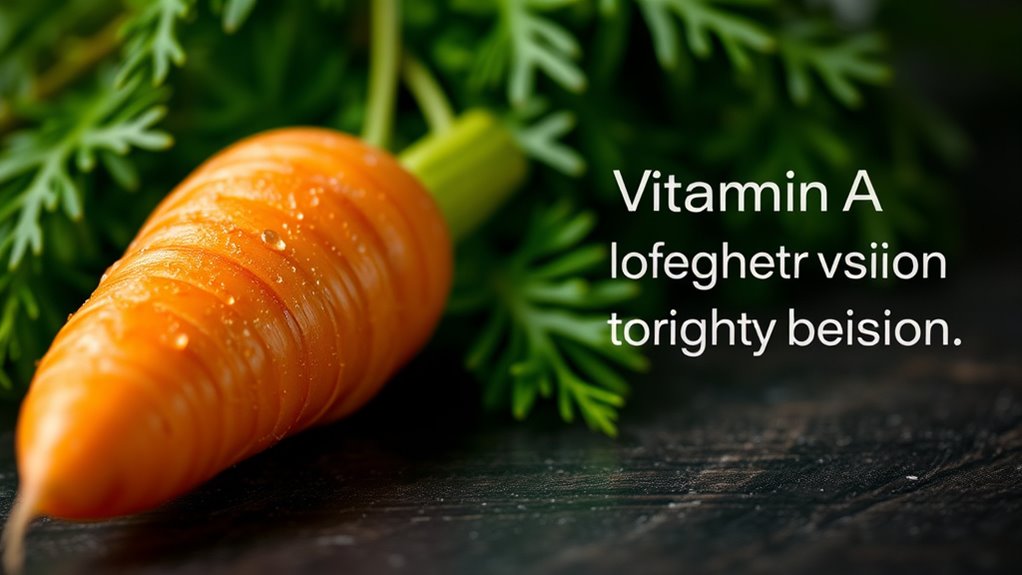
Vitamin A plays an essential role in keeping your photoreceptors healthy, which is important for seeing in low light.
You can get this critical nutrient from animal products like liver and dairy, or from colorful fruits and veggies such as carrots.
If you’re lacking Vitamin A, you might notice symptoms like night blindness or dry eyes, underscoring its significance for your vision.
Importance for Photoreceptors
Without adequate vitamin A, your photoreceptors can’t function properly, making it difficult to see in low light conditions.
These essential cells in your eyes convert light into visual signals, and a deficiency can lead to serious issues. Here are some key points to reflect on:
- Vitamin A is fundamental for producing pigments in the retina.
- A deficiency can result in night blindness and dry eyes (xerophthalmia).
- Retinol, the active form of vitamin A, is primarily found in animal-derived foods.
- Provitamin A carotenoids, like beta-carotene, contribute to your vitamin A needs from colorful fruits and vegetables.
Ensuring you get enough vitamin A is critical for maintaining healthy photoreceptors and best vision.
Dietary Sources Available
To guarantee your eyes function at their best, it’s crucial to include a variety of dietary sources rich in vitamin A. This important nutrient helps maintain photoreceptors in your eyes, promoting ideal vision, especially in low light.
Animal-derived foods like liver, egg yolks, and dairy products provide retinol, the active form of vitamin A. Meanwhile, plant sources like carrots are packed with beta-carotene, a carotenoid antioxidant that your body converts into vitamin A. Including these foods in a healthy diet can meet about 30% of your daily vitamin A needs.
Regular consumption of these dietary sources not only supports eye health but also confirms you’re getting other necessary nutrients for overall well-being. So, make certain to add these options to your meals!
Deficiency Symptoms Observed
Incorporating vitamin A into your diet is crucial for maintaining ideal vision, particularly in low-light situations.
When you experience vitamin A deficiency, you may notice several deficiency symptoms, including:
- Night blindness: Difficulty seeing in dim light due to impaired function of photoreceptors.
- Dry eyes: This can lead to discomfort and, if untreated, serious eye conditions.
- Increased risk: An inadequate intake can raise your risk of developing serious eye issues by 50%.
- Skin problems: Dry skin or rough patches can also indicate a lack of this essential nutrient.
Ensure you’re getting enough dietary sources like liver and egg yolks, or consider supplementation to combat these symptoms effectively.
Your eyes deserve the best!
The Benefits of Vitamin C for Your Eyes
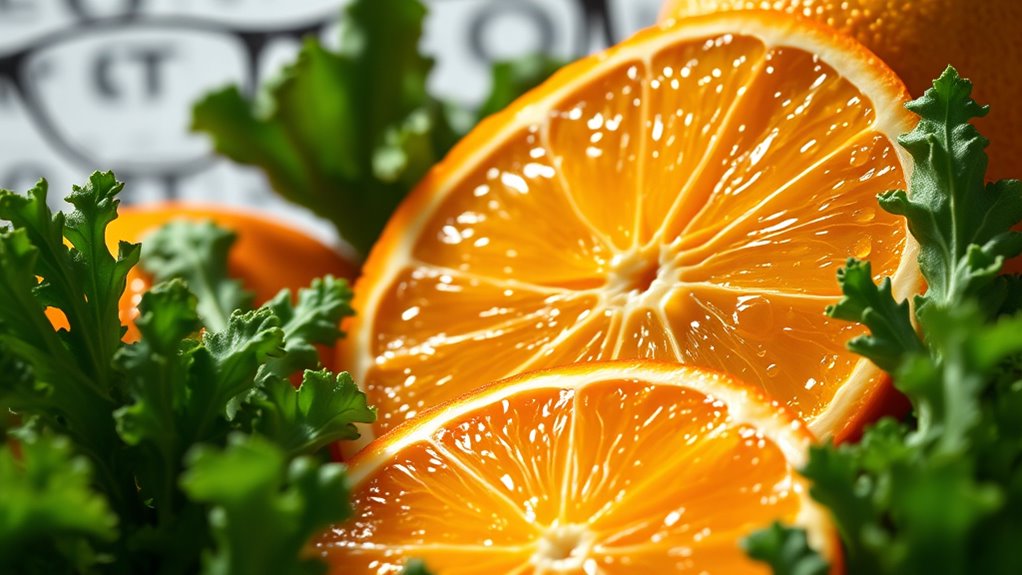
As you prioritize your eye health, don’t overlook the essential role of vitamin C. This powerful antioxidant protects your eyes from oxidative stress, considerably reducing the risk of cataracts and age-related macular degeneration (AMD).
In fact, the concentration of vitamin C in the aqueous humor of your eye is about 20 times higher than in blood plasma, emphasizing its importance. Regularly consuming vitamin C-rich foods, like citrus fruits, bell peppers, and broccoli, can lower your chances of developing cataracts.
However, be cautious with high doses, as they might accelerate cataract development. Aim for a daily intake of around 500 mg to help maintain ideal eye function and reduce the risk of various eye diseases.
Your eyes will thank you!
Protecting Your Eyes With Vitamin E

Vitamin E plays a significant role in protecting your eyes from oxidative stress, making it essential for maintaining retinal health. This powerful antioxidant safeguards the fatty acids in your eyes, supporting overall eye function.
Vitamin E is crucial for eye health, providing antioxidant protection and supporting retinal function against oxidative stress.
To keep your eyes healthy, consider these key points:
- A severe deficiency in vitamin E can lead to retinal degeneration or even blindness.
- Regular intake can reduce the risk of cataracts, especially when combined with vitamins B6 and B3.
- Foods rich in vitamin E include almonds, sunflower seeds, and vegetable oils.
- The recommended daily intake is 400 IU to combat free radicals that contribute to age-related vision problems.
Incorporating vitamin E into your diet is critical for ensuring lasting eye health.
Omega-3 Fatty Acids: A Boost for Retinal Health
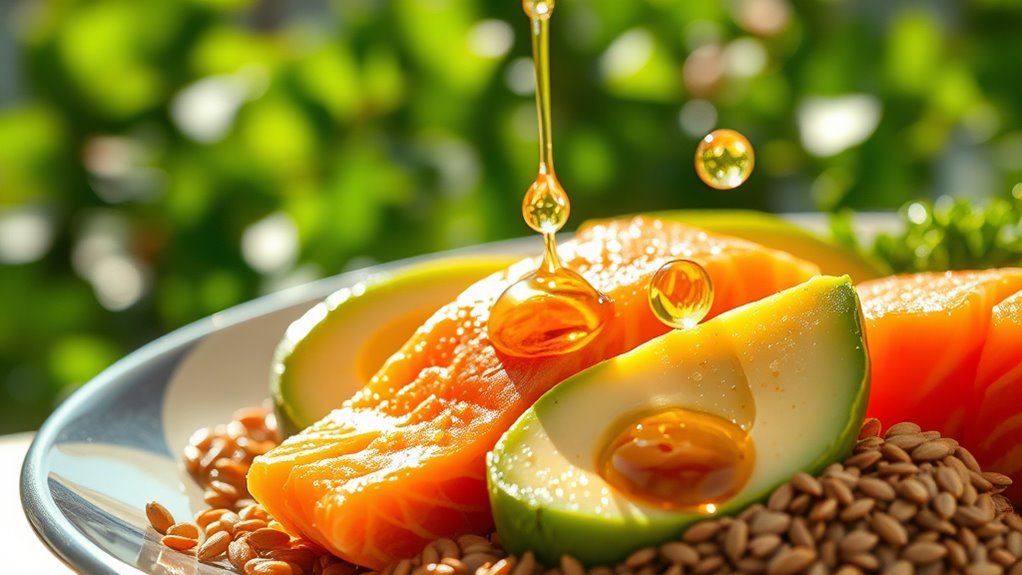
While vitamin E plays a key role in eye health, omega-3 fatty acids take that support a step further by promoting retinal well-being.
These essential nutrients, particularly EPA and DHA, are important for maintaining retinal health, as DHA forms a significant part of retinal cell membranes. Regular intake of omega-3s has been linked to a reduced risk of age-related macular degeneration (AMD), making them essential for long-term vision health.
You can find these beneficial fats in cold-water fish like salmon, tuna, and sardines. Additionally, omega-3 fatty acids may help alleviate symptoms of dry eye disease, offering relief to those affected.
Incorporating omega-3-rich foods into your diet is a smart move for supporting your eyes.
The Importance of Zinc for Ocular Function
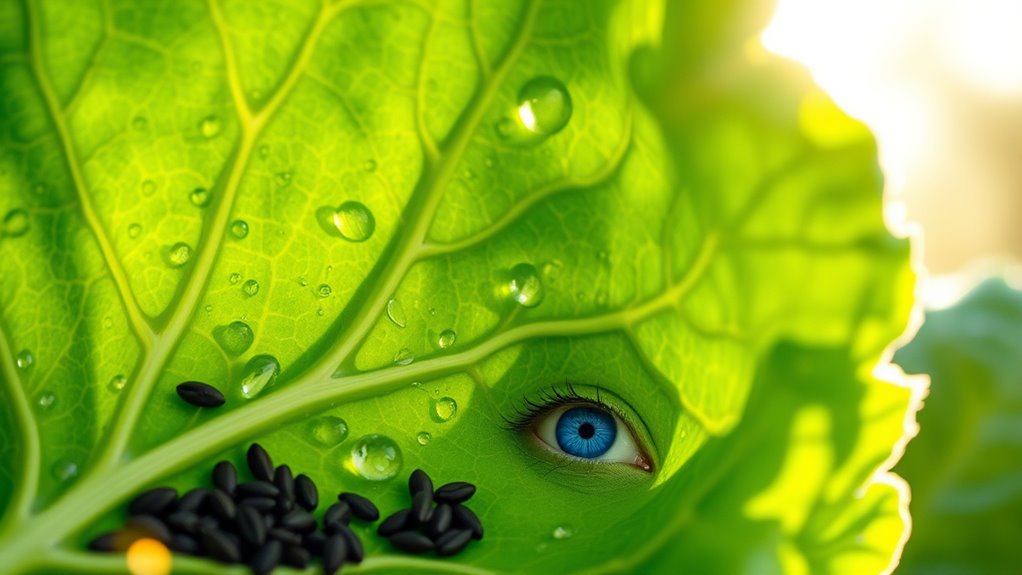
Zinc plays a crucial role in your vision by helping transport vitamin A to the retina, which is essential for healthy eyes.
If you’re not getting enough zinc, you could face serious vision issues, including night blindness and a higher risk of age-related macular degeneration.
Incorporating zinc-rich foods like oysters and pumpkin seeds into your diet can help keep your eyes functioning at their best.
Zinc’s Role in Vision
A essential mineral for maintaining eye health, zinc plays a significant role in vision. Here’s why you should pay attention to zinc:
- Visual Pigments: Zinc is important for forming visual pigments, enabling light perception.
- Night Vision: It helps transport vitamin A to the retina, necessary for preventing night blindness.
- AMD Prevention: A deficiency can increase the risk of age-related macular degeneration (AMD) and cataracts.
- Supplementation Benefits: Studies show zinc supplementation can reduce the progression of AMD by about 25%.
To maintain best eye health, make sure your diet includes adequate zinc from various dietary sources.
Incorporating zinc-rich foods can support your vision and help protect against serious eye conditions.
Dietary Sources of Zinc
Ensuring you get enough zinc in your diet is essential for ideal eye health and function. Zinc is vital for forming visual pigments, which help prevent night blindness and support overall ocular function.
Dietary sources rich in zinc include oysters, lean meats, poultry, beans, nuts, and fortified cereals. For adults, the recommended daily intake is about 11 mg for men and 8 mg for women.
A zinc deficiency can lead to severe eye issues, including impaired vision and an increased risk of age-related macular degeneration (AMD). By incorporating these zinc-rich foods into your diet, you can protect your eyes, transport vitamin A to the retina, and produce melanin, which guards against cataracts and other eye disorders. Additionally, maintaining a balanced diet that includes investment in health can enhance overall well-being and reduce the risk of chronic diseases.
Lutein and Zeaxanthin: Natural Eye Protectors

While you mightn’t think much about your eyes, lutein and zeaxanthin play an essential role in protecting them.
These carotenoid antioxidants are concentrated in the macula of your retina, filtering harmful blue light and reducing oxidative damage. Incorporating these nutrients into your diet can considerably enhance your eye health.
Here’s why you should consider lutein and zeaxanthin:
- They can reduce the risk of age-related macular degeneration (AMD) by up to 57%.
- The recommended intake is 6 to 20 mg of lutein and 2 mg of zeaxanthin daily.
- Rich sources include spinach, kale, and egg yolks with healthy fats.
- The AREDS2 study confirms their effectiveness in slowing AMD progression.
Adopting a Healthy Lifestyle for Optimal Eye Health
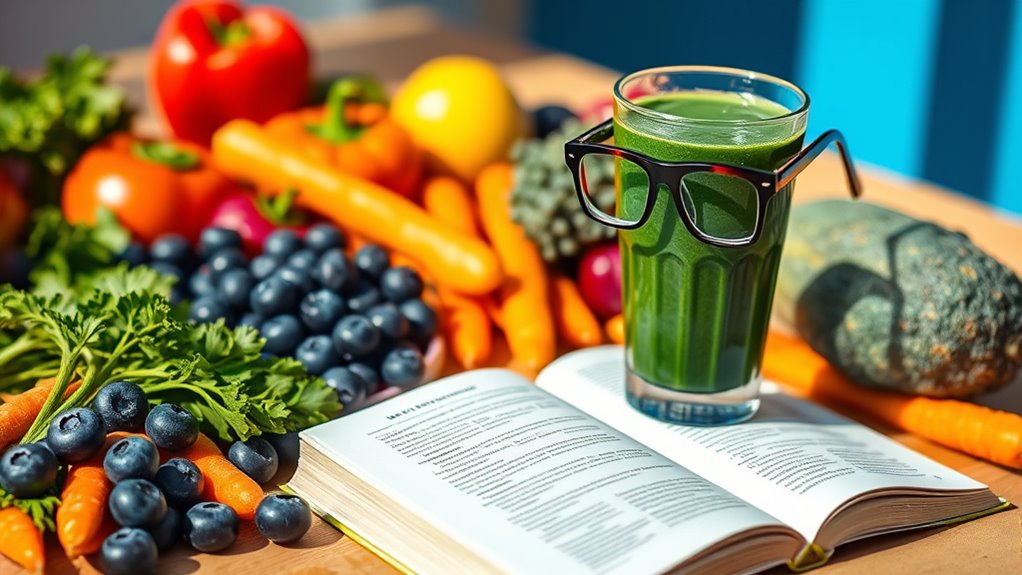
To achieve ideal eye health, adopting a healthy lifestyle is essential. Start by focusing on a balanced diet rich in vitamins A, C, and E, along with omega-3 fatty acids. Including low carb high protein breakfast ideas can also support your overall health and energy levels, which indirectly benefits your eyes. Additionally, regular physical activity can enhance overall well-being and improve circulation, ensuring your eyes receive the nutrients they need for optimal vision.
Incorporate colorful fruits and vegetables into your meals, as they provide essential antioxidants that protect your eyes from oxidative stress. Regular exercise boosts circulation, ensuring your eyes receive the nutrients they need for optimal vision.
Maintaining a healthy weight is important too, as obesity raises the risk of diabetes and hypertension, which can harm your eyes. Additionally, adequate sleep plays a crucial role in supporting overall health, including eye function and recovery.
Finally, don’t forget hydration; drinking enough water helps maintain tear production and prevents dry eyes.
Frequently Asked Questions
What Is the Best Vitamin to Improve Eyesight?
If you’re looking to improve your eyesight, Vitamin A is one of the best options. It helps maintain photoreceptors in your eyes, preventing issues like night blindness.
Incorporating foods rich in Vitamin A, such as liver, egg yolks, and dairy, can be beneficial. Additionally, antioxidants like Vitamins C and E also support overall eye health, protecting against oxidative damage.
Make sure you’re including these nutrients in your diet for ideal vision.
Which Fruit Is a Miracle for Eyesight?
If your eyes could talk, they’d sing the praises of citrus fruits! Oranges and grapefruits, bursting with vitamin C, are fantastic for your eyesight. These juicy wonders help reduce the risk of cataracts and may slow down age-related eye issues.
But don’t stop there—add blueberries and kiwi to your plate for added antioxidants and nutrients. Eating a colorful array of fruits will keep your vision sharp and your eyes happy!
What Nutrient Deficiency Causes Eye Problems?
Nutrient deficiencies can lead to various eye problems. If you’re lacking vitamin A, you might experience night blindness and dry eyes.
A shortage of antioxidants like lutein and zeaxanthin can increase your risk of age-related macular degeneration (AMD) and cataracts. Insufficient vitamin C may worsen cataracts as well.
Don’t forget zinc and omega-3 fatty acids; both are essential for maintaining healthy vision and preventing conditions like dry eye disease.
What Is the Most Important Nutrient for the Eyes?
What if I told you that one nutrient holds the key to clear vision? When it comes to eye health, vitamin A stands out as the most significant nutrient.
It’s essential for maintaining the photoreceptors in your eyes, helping you see in low light and preventing dry eyes.
But don’t stop there—nutrients like omega-3s and antioxidants also play vital roles in keeping your vision sharp and reducing the risk of age-related issues.
Conclusion
Taking care of your eyes is as essential as scrolling through your social media feed. By fueling your body with the right nutrients like vitamins A, C, and E, along with omega-3 fatty acids, you’re investing in your visual health. Don’t forget about zinc and the eye-protecting duo, lutein and zeaxanthin! So, ditch the junk food and embrace a healthier lifestyle. Your eyes will thank you now and in the future, ensuring you keep seeing the world clearly.
